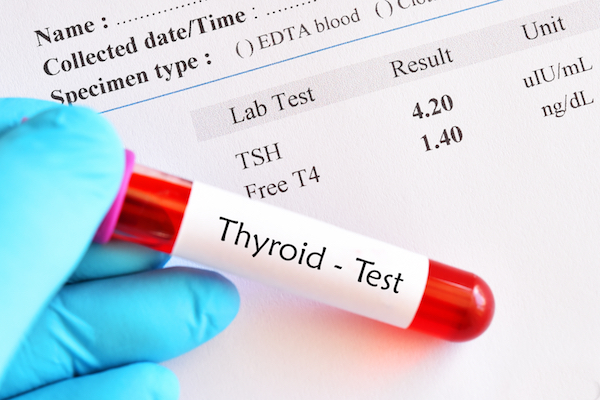
The thyroid is a small, butterfly shaped gland at the base of your neck. Its part of an intricate network of glands making up the endocrine system. The thyroid gland manufactures hormones that regulate the body’s metabolic rate, controlling heart, muscle and digestive function, brain development and bone maintenance.
Thyroid dysfunction can severely affect our day to day life but it often creeps up so slowly that issues such as brain fog, irritability and weight gain are attributed to ageing, poor sleep patterns, diet or stress. It can also be that poor thyroid function is causing or accelerating hair loss, thinning skin, poor memory and a myriad of other problems.
According to a number of experts, a whopping 40-60% of people with thyroid disorders do not realise that they have problems with their thyroid! This is largely due to the standard method used to evaluate thyroid health.
Many GP’s will test Thyroid Stimulating Hormone (TSH) levels only. If the TSH is high, this means the brain sensed low T3 levels, so it is now yelling at the thyroid to make more. If the TSH is low, this means that the brain senses a lot of T3 in the blood. When TSH comes back abnormal, doctors will then usually test for T4 levels.
Sounds like a reasonable way to assess thyroid function indirectly. But here is the problem. The reference range for TSH is not accurate. According to the UK reference range, your thyroid function is normal if your TSH is anywhere between 0.4 and 4. That is a huge range of thyroid function!
The truth is that most people feel at their best when their TSH level is between 1 and 2. Most people will consistently feel out of balance if their TSH is below 1, let alone 4 or above. Yet most doctors will not even further assess your thyroid function until your TSH is greater than 4. Until that time, you may be told that your thyroid is fine and that there is nothing wrong with you. And the cause of your fatigue, digestive issues, depression, and insomnia will remain a frustrating mystery.
If your TSH is greater than 2, it is time to get further evaluation. Either find a doctor who understands thyroid physiology (integrative medicine is popular) or do it yourself. Increasingly, the power to understand our own health is in our hands. Full thyroid biomarker at-home tests can be ordered from various dependable labs such as Blue Horizon. Thyroid UK endorses a number of companies offering private testing. (https://thyroiduk.org/getting-a-diagnosis/thyroid-testing-info/private-testing/)
A COMPLETE THYROID EVALUATION PANEL SHOULD INCLUDE:
◗ TSH
◗ free T4 (thyroxine)
◗ free T3 (triiodothyroninenti)
◗ anti-TG
◗ reverse T3 (optional)
I would urge anyone with a TSH level over 2, who also experiences a number of the symptoms below, to find a practitioner who believes in diagnosing according to the above complete panel and the symptoms a person is portraying.
HYPER AND HYPOTHYROIDISM
People who suffer from either hypothyroidism or hyperthyroidism may experience some or all of the related symptoms. Hypothyroidism is more common than hyperthyroidism.
HYPERTHYROIDISM SYMPTOMS INCLUDE:
◗ Weight loss
◗ Increased appetite
◗ Fast heart rate
◗ Anxiety/nervousness
◗ Irritability
◗ Shaking/trembling of the hands
◗ Sweating
◗ Feeling warm often/greater sensitivity to heat
◗ Insomnia
◗ Frequent bowel movements and/or diarrhoea
◗ Muscle weakness
◗ Thin skin and brittle hair
◗ Changes in the menstrual cycle
(usually shorter, lighter periods)
HYPOTHYROIDISM SYMPTOMS INCLUDE:
◗ Weight gain and/or difficulty losing weight
◗ Constipation
◗ Memory problems
◗ Depression
◗ Dry skin and hair/hair loss
◗ Slow heart rate
◗ Feeling cold often/greater sensitivity to cold
◗ Changes in the menstrual cycle
(usually longer, heavier periods)
HASHIMOTO’S DISORDER
Hashimoto’s Disorder is an autoimmune disorder in which the body’s immune system mistakenly attacks and slowly destroys the thyroid gland and its ability to produce hormones. It can develop at any age and the causes are unclear. Some people with mild cases of Hashimoto’s may have no obvious symptoms. The disease can remain stable for years, and symptoms are often subtle. Left untreated, Hashimoto’s can cause hypothyroidism.
Symptoms can include all of the above, with a perplexing feeling of see-sawing between hyper and hypothyroidism. Commonly, when not see-sawing, the following may be apparent:
◗ Fatigue
◗ Dry skin
◗ Dry, thinning hair
◗ Pale, puffy face
◗ Muscle and joint aches
◗ Irregular menstruation
◗ Intolerance to cold
The good news is that these thyroid diseases are treatable once diagnosed. An integrative approach to diagnoses and treatment is best, for example testing for food intolerances too if the autoimmune, Hashimoto’s is diagnosed.
*Subclinical hypothyroidism is categorised as TSH levels above the UK range of 4 but with normal levels of T4 and T3. Subclinical hypothyroidism can be symptomless and is, controversially, not routinely treated in the UK.




